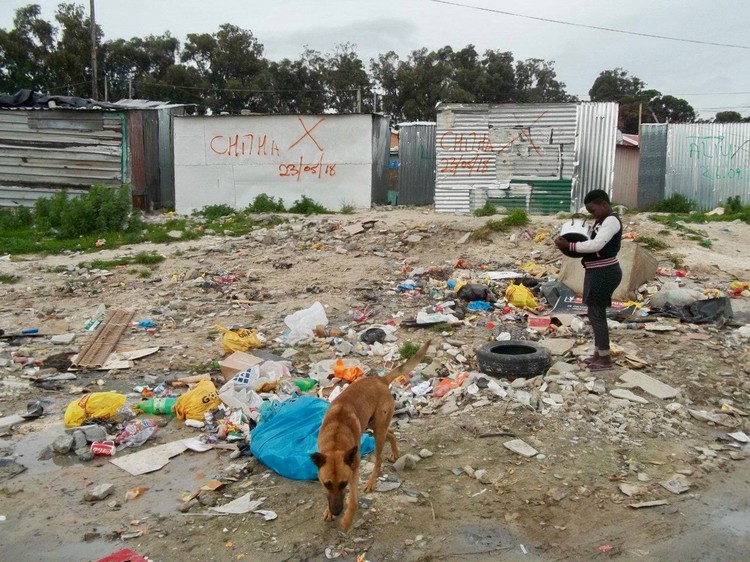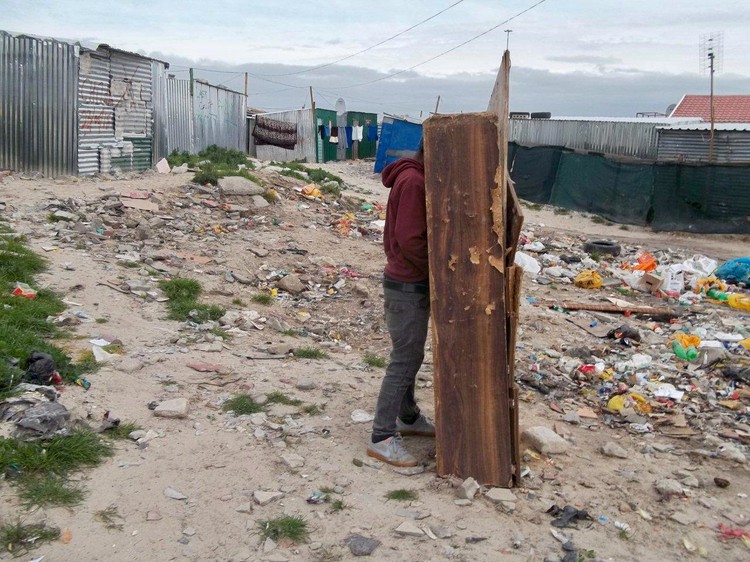110 families in Mfuleni have no taps, toilets, electricity or even rubbish bin bags
“Government never told us where we should live after we had to move out”
Over 110 families live in Mzamomhle, Mfuleni, with no taps, basic sanitation or electricity. People moved to the informal settlement in 2016 after they lost their backyard shacks when the Western Cape Department of Human Settlements built new RDP houses on the yards in which they were staying.
Community leader Sizwe Ncamiso says the authorities had no relocation plans for backyarders. “Government never told us where we should live after we had to move out,” says Ncamiso.
Mzamomhle has no public toilets. A makeshift, open urinal made from plyboard and wooden planks is where men relieve themselves. It is located in an illegal rubbish tip. Women use buckets in their shacks and dump the human waste at the rubbish tip.
“The rubbish collectors say that they can’t give us [rubbish] bags unless we ask the municipality to tell them to give [bags to] us,” says Ncamiso.
“On windy days, wind pushes rubbish into my shack and makes it dirty. We need rubbish bags and wheelie bins here,” says resident Thembisa Jikijela. “Residents keep on dumping rubbish there because they have nowhere else to do so.”
Shack dwellers beg for water from their former landlords who still have toilets with water taps outside their new RDP houses. Ncamiso says house owners sometimes refuse to give them water, saying their water bills will be too high. They also don’t want the shack dwellers using their outside toilets. About 15 residents are able to afford illegal electricity connections from neighbouring houses, but most house owners don’t want illegal connections because they say their electricity boxes won’t handle the added load.
Andiswa Mveku, who lives with her eight-year-old son, is bit more fortunate than most. She gets 20 litres of water a day from a houseowner. She also has an illegal electricity connection for which she pays R500 per month. She has domestic work in Fish Hoek; her husband is a construction worker in Paarl.
Men living in Mzamomhle relieve themselves at this makeshift, open urinal located in an illegal rubbish tip. Photo: Vincent Lali
Mayoral Committee Member for Informal Settlements, Water and Waste Services; and Energy, Councillor Xanthea Limberg, said: “The City is aware of the informal dwellers mentioned and can confirm that they were initially boarders of formal property owners.”
Limberg said in 2017 the City was made aware that “the local leadership in the Bardale area encouraged these informal dwellers to move away from the private properties on which they previously lived and claimed that this was supported and approved by City officials.”
“This was false information and initiated without consultation with the City,” said Limberg.
She said the City had plans to provide basic services for people staying in old informal settlements, but not for shack dwellers staying on illegally occupied land.
Limberg said: “Furthermore, the illegal electricity and water connections in newly established unplanned settlements potentially place the entire metro area at risk.”
© 2018 GroundUp.
This article is licensed under a Creative Commons Attribution-NoDerivatives 4.0 International License.
You may republish this article, so long as you credit the authors and GroundUp, and do not change the text. Please include a link back to the original article.




